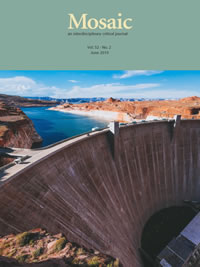Issue 52.2
Overview

General Issue
Published: June 2019
View the issue introduction or see the issue summary and contents below.
10 essays, totalling 208 pages
$24.95 CAD
Opening with a photo-essay by Ibon Aranberri and two essays on the topic of “decolonizing water,” this issue also addresses topics including nineteenth-century glacial theory, Dracula and imperialism, psychoanalysis and Wuthering Heights, time travel in Moorcocks’s Behold the Man, the spectral artwork of Oscar Muñoz, curiosity in the Squire’s Tale, anthropomorphism and poetry, and bashfulness in the work of Margaret Cavendish.
Groundwater as HyperobjectDeborah Wardle The essay explores ideas about groundwater in terms of its characteristics as a hyperobject. Key hydrogeology concepts and the conflicts and dilemmas in uses and abuses of groundwater in Australia underpin a search for the metaphorical potency of groundwater. Literature uncovers how allegorical tones of groundwater may be expressed. | |
Living, Land-Broken Waters: Epistemological Resistance in Solar StormsNed Schaumberg This essay argues that characters in Linda Hogan’s novel Solar Storms resist the erasure of Indigenous culture through stories they tell about human relationships with water. These stories emphasize water’s transcendence of settler frameworks for explanation and control, foregrounding its role in re-shaping Indigenous resistance to continually expanding colonial development. | |
Looking for Louis Agassiz: A Story of Rocks and Race in MaineMarion K. McInnes Swiss-born geologist Louis Agassiz helped create modern glacial theory in the nineteenth century, but he did lasting harm in the name of science by promoting the idea of superior and inferior races. In this essay, I tell the story of a curious monument to Agassiz in Maine and weigh its political and cultural implications. | |
The ‘Nineteenth Century Up-to-Date with a Vengeance’: From Dracula’s ‘Horrid Cargo’ to ‘Ghastly’ Millennial FreightageThorell Porter Tsomondo Focusing on Dracula’s metaphoric East-to-West apportionment and transportation of “land”—his conveyance of fifty large crates of imported earth to the former colonial centre—this essay examines Stoker’s anatomization of nineteenth-century cross-Atlantic imperialism, highlighting his on-the-mark prefigurement and critique of the present global immigration crisis and the “terror” it inherits as well as enlists. | |
Desire, Identification, and Two Peculiar Deaths: The Long Story of Wuthering HeightsLorraine Markotic In Wuthering Heights, both Catherine’s and Heathcliff’s deaths contradict their strong character; these deaths are best explicable in relation to the early intertwining of identification and desire, as expounded by Lacan and Kristeva. Furthermore, the story of the second generation—which disappoints most readers—is shown actually to continue the first. | |
The Imitation of Christ: Michael Moorcock’s Behold the ManRowland Wymer Michael Moorcock’s Behold the Man is a disturbing and original contribution to the modern Jesus-novel. It is an exploration of the “truth” of Christianity, using ideas from Nietzsche, Jung, and Freud as part of a classic SF time-travel-loop paradox which forces the reader to think deeply about what the “imitation of Christ” might really mean. | |
Self and Other in Aliento by Oscar Muñoz: Spectral Encounters or the Ghostly Afterlife of ImagesLaura García Moreno The essay considers ethical and political dimensions of Aliento, an installation by Colombian artist Oscar Muñoz. It establishes affinities between the installation, Emmanuel Levinas’s intersubjective understanding of ethics, and the firefly motif that Georges Didi-Huberman develops as a political metaphor of resistance and interrogative memory. | |
Vitium Curiositatis and Stereotypes in Chaucer’s Squire’s TaleReena Thomas and Ethan K. Smilie The Squire’s Tale conveys a fragmented reality through its portrayal of the East, which is both strange and familiar. By imagining the Orient as a mysterious, though stereotypical, novelty and contrasting it with the novelties in pars secunda’s romance, Chaucer denotes a reverence for wonder—affording the Other solemn dignity. | |
Liminal Encounters: Ethics of Anthropomorphism in the Poetry of Levertov, Szymborska, and FultonChristopher Kelen and Chengcheng You This essay examines conceptions of animals and human-animal relations in the poetry of Denise Levertov, Wisława Szymborska, and Alice Fulton, with a focus on whether human thinking can take us beyond the limits of a poetic construction of animals as others. | |
‘No Crime to Be Bashful’: Social Anxiety in the Drama of Margaret CavendishJes Battis This essay will discuss the role of social anxiety in the work of Margaret Cavendish, with a particular emphasis on blushing, speechlessness, and what we would now call introversion. The bashfulness that she presents in her work as a "crimeless defect," I will argue, is both a form of transgressive modesty and a reaction against environmental sensitivity. In plays such as Lady Contemplation, The Presence, and Love’s Adventures, Cavendish is interested in staging various failures of communication. |